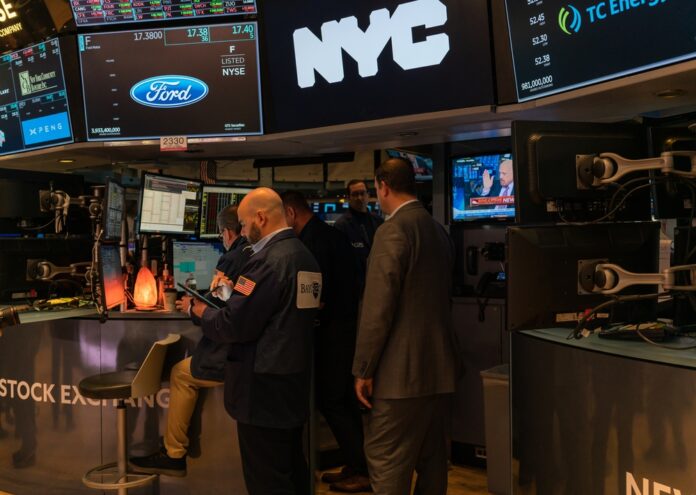U.S. stock markets opened higher on Tuesday, continuing the gains seen in the previous session, as investors reacted to President Donald Trump’s series of executive orders and awaited a slew of important corporate earnings reports scheduled for release this week.
Global market sentiment wavered following Trump’s inauguration on Monday. Initial relief that his executive orders did not immediately include trade tariffs was tempered when Trump told reporters he was considering imposing a 25% tariff on both Canada and Mexico starting February 1.
In early trading, the benchmark S&P 500 index gained 27 points, or about 0.5%, while the tech-heavy Nasdaq Composite added 83 points, or 0.4%. The Dow Jones Industrial Average rose by 151 points, or 0.4%. Wall Street’s major indices had been closed on Monday in observance of Martin Luther King Jr. Day. On the prior Friday, the S&P 500 advanced 1% to 5,996.66, the Dow Jones gained 0.8% to 43,487.83, and the Nasdaq Composite jumped 1.5% to 19,630.20.
Trump Takes Office and Signs a Series of Executive Orders
On his first day in office, Trump signed numerous executive orders—legally binding directives to the federal government that do not require congressional approval—addressing a wide range of issues.
Regarding trade, Trump has yet to take immediate steps to impose steep tariffs on allies and adversaries, indicating that he is “not yet ready for it.” However, he directed federal agencies, including the Commerce and Treasury departments and the U.S. Trade Representative, to examine the economic and national security risks posed by trade deficits. He asked for recommendations on “appropriate” responses, including a supplemental global tariff or other policies to remedy these issues.
On immigration, Trump signed an executive order ending the longstanding practice of automatically granting birthright citizenship. This decision, set to take effect in 30 days, is expected to face significant legal challenges.
Trump also withdrew the U.S. from the Paris Climate Agreement and the World Health Organization and issued an order delaying the TikTok ban by 75 days. Originally, the platform was set to shut down in the U.S. on January 19.
Additionally, Trump finalized measures to end diversity, equity, and inclusion programs within the federal government. He also established the Department of Government Efficiency, which will be directed by Tesla CEO Elon Musk.
In a note to clients, analysts at Capital Economics stated that “a reasonable degree of volatility” is expected to persist in financial markets for the foreseeable future. However, they anticipate that Trump’s first year in office could coincide with a rally in both stocks and the U.S. dollar.
Corporate Earnings in Focus
Investors are closely watching this week’s corporate earnings, with results from several major U.S. companies set to shape market sentiment.
Netflix (NFLX), the video streaming giant, is scheduled to report its quarterly earnings after markets close on Tuesday.
Earlier in the session, 3M Co. (MMM) posted fourth-quarter results that beat analysts’ forecasts. The company’s 2025 earnings outlook was largely in line with market estimates, sending its shares higher in early trading.
Charles Schwab (SCHW) also saw its shares rise after reporting fourth-quarter adjusted earnings per share that exceeded analysts’ median estimates.
Analysts suggest these earnings reports will provide insight into the market’s trajectory following a mixed start to 2025. Strong corporate earnings could be a key driver of equity returns this year, especially as uncertainty surrounding Trump’s trade policies and strong economic data cloud the path forward for potential Federal Reserve rate cuts.
Last week, several major U.S. banks, seen as barometers of the broader business environment, posted positive earnings results, buoyed by a revival in business activity.



